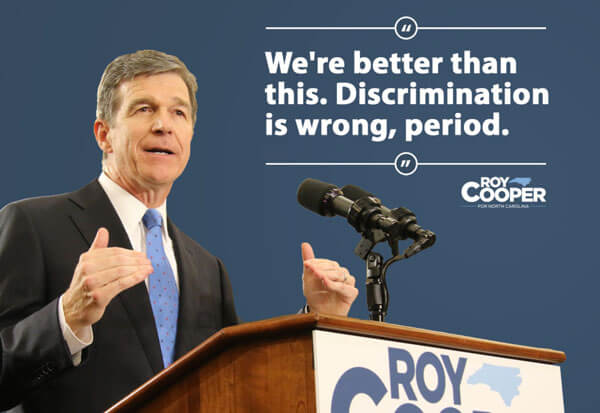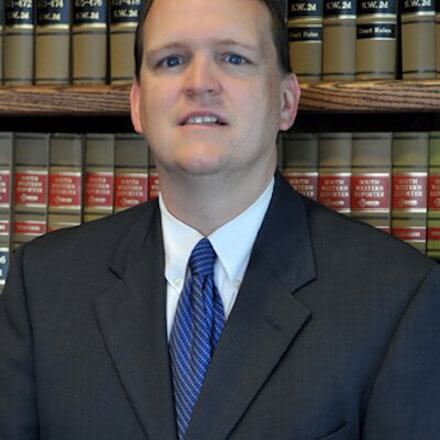A campaign ad for Democratic Governor-elect Roy Cooper. | ROYCOOPER.COM
Amidst an overheated war between North Carolina’s Republican Legislature and its new Democratic governor-elect, the Legislature has cratered a deal to which it had agreed under which it would repeal its notorious HB 2 – known nationally (and mockingly) as the “bathroom bill” – in return for the Charlotte City Council repealing the human rights ordinance that the GOP had used to justify its draconian assault on the privacy rights of transgender people.
The inaction by the Legislature on December 21 sparked immediate outrage among LGBTQ advocates. Even with the prospect the offensive measure might be struck, many of them had voiced varying levels of unhappiness with the loss of local rights protections being the price of achieving that.
The controversy began this past spring after Charlotte amended its municipal human rights ordinance, adding sexual orientation and gender identity to other existing prohibited grounds for discrimination and guaranteeing that transgender people using public restroom facilities would be able to access those consistent with their gender identity. As the measure was due to take effect, the Republican-led Legislature, in emergency session, rushed through a measure barring municipalities from enacting a variety of local measures, including civil rights protections that went beyond those guaranteed in state law.
GOP legislators renege even after Charlotte rolls back its rights law
The law, HB2, not only prevented local LGBT nondiscrimination progress while the prospects for statewide protections remain dim, but it also explicitly barred people from using a public restroom facility inconsistent with the gender marker on their birth certificate. Without undergoing gender reassignment surgery, a transgender person cannot alter their birth certificate, so the measure effectively outlawed many trans North Carolinians from access to appropriate bathroom facilities.
The storm that erupted over the regressive measure quickly hurt North Carolina, which lost an estimated $600 million dollars in business, including the cancellation of future NBA and NCAA championship games. Polls by the Human Rights Campaign and Equality North Carolina indicate that the controversy contributed to Republican Governor Pat McCrory, a former Charlotte mayor who eagerly signed the measure, losing in a close reelection battle against Democrat Roy Cooper, the attorney general who declined to defend HB2 in court.
McCrory refused to concede defeat for almost a month, and after he did so, the Republican Legislature rushed through a series of curbs on the future governor’s powers, which McCrory signed last week. Despite that bad blood, Cooper was willing to work with GOP legislative leaders in the hopes of achieving a deal to get rid of HB2.
On December 19, the Charlotte City Council overturned the explicit protections for transgender people accessing public bathrooms and two days later repealed all of the LGBT rights amendments adopted this past spring.
On several occasions prior to McCrory’s loss in November, Republicans had proposed much the same deal to Charlotte to no avail. LGBTQ advocates had said civil rights protections in Charlotte should not be traded for the lifting of onerous prohibitions statewide.
This week, however, advocates seemed to recognize they would have to accept what HRC described as “a deal [Cooper] brokered with state lawmakers” – unhappy as they were with the compromise. HRC’s statement was cautious, focused largely on the need “to chart a new course guided by the state's values of dignity and respect, not discrimination and hate – and to ensure non-discrimination protections exist in cities, towns, and across the state of North Carolina.”
In the same release, Chris Sgro, executive director of Equality North Carolina, was more direct, saying, “The problem has never been Charlotte. Charlotte's ordinance was a best practice employed in hundreds of cities across the country. The Charlotte City Council and mayor did the right thing by passing their ordinance.”
Still, Sgro’s statement ended by focusing on what could be achieved once HB2 is off the books.
“We look forward to working with Governor-elect Cooper to win protections community by community and statewide,” he said.
Lambda Legal, which with the American Civil Liberties Union sued North Carolina over HB2, voiced more explicit dissatisfaction about the compromise.
“LGBT rights aren’t a bargaining chip. Charlotte shouldn’t have had to repeal its ordinance in exchange for H.B. 2 to be repealed,” Lambda’s southern regional director, Simone Bell, said in a written statement. “LGBT people in North Carolina still need protection from discrimination.”
Grumpy acceptance, however, was not the end of the story. At the end of a long day in the state capital, legislators went home without delivering the repeal they had promised.
Chad Griffin, HRC’s president, in a statement issued shortly after legislators went home, said, “Today, the public trust has been betrayed once again. Lawmakers sent a clear message: North Carolina remains closed for business. It’s been 273 days since Republican state lawmakers passed the hateful HB2 law, and they have resisted fixing the mess they created every step of the way. Even after Charlotte responded to the GOP leadership’s loathsome demand to repeal common sense protections that exist in more than 100 cities, Senator [Phil] Berger and Speaker [Tim] Moore failed to make good on the ‘deal’ they brokered with Governor-elect Cooper to fully repeal HB2. Their shameful actions and broken promises subject LGBTQ North Carolinians to state-mandated discrimination, contribute to a heightened environment of harassment and violence, and will continue the significant harm done to the state’s reputation and economy.”
“It is a shame that North Carolina’s General Assembly is refusing to clean up the mess they made,” James Esseks, director of the ACLU’s LGBT & HIV Project, said in a written statement. “The support for the LGBT community from political leaders, faith leaders, businesses, and everyday people that has emerged this year will not fade. These attempts to expel transgender people from public life will not be tolerated. The Legislature may not be willing to undo their unconstitutional overreach and respect the rights of LGBT people, so we’ll just have to see them in court.”
Even before the Legislature’s latest treachery, an old hand in the LGBTQ movement signaled his frank assessment of the situation.
On Facebook, Matt Foreman, a former executive director of the Empire State Pride Agenda and the National LGBTQ Task Force who now holds a senior post at the Evelyn & Walter Haas, Jr. Fund, wrote, “I don't get the North Carolina “deal” – yes, HB2 will go, but so did protections for LGBT people in Charlotte with no commitment to restoring them. And there's zero chances for a statewide nondiscrimination law. Why are we being told this is a breakthrough? This smacks of pure insider dealing at its worst.”
Apparently, even insider dealing didn’t work this time.




































